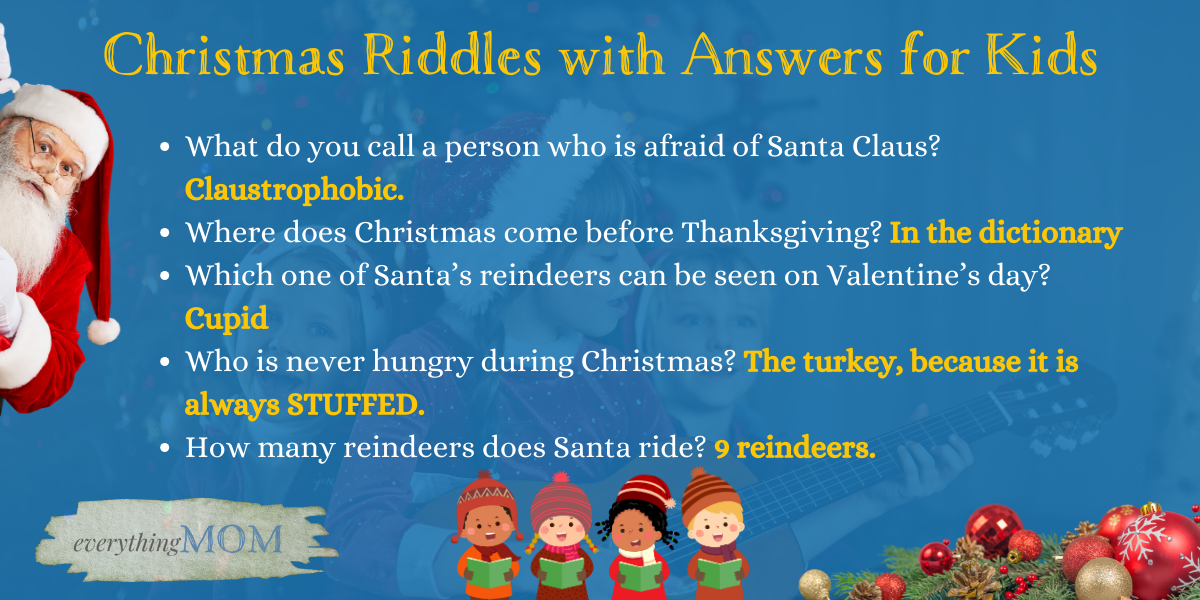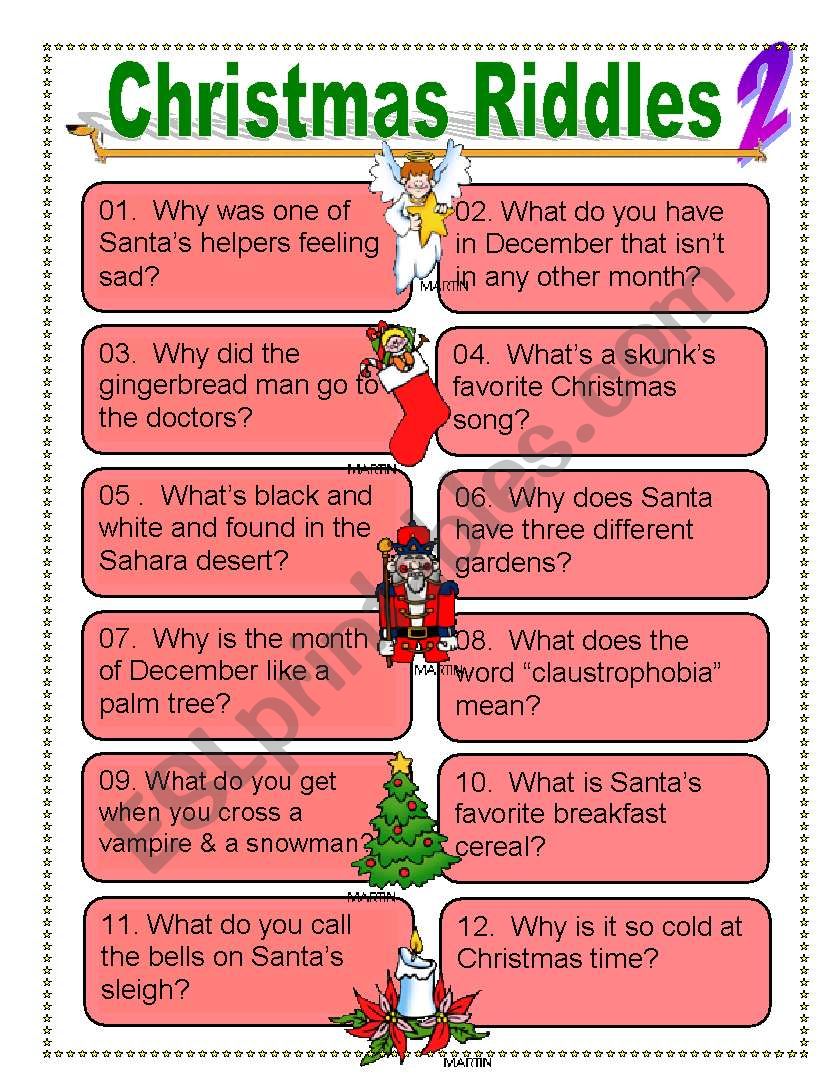Unveiling the Magic of Christmas Riddles for Children
Related Articles: Unveiling the Magic of Christmas Riddles for Children
Introduction
In this auspicious occasion, we are delighted to delve into the intriguing topic related to Unveiling the Magic of Christmas Riddles for Children. Let’s weave interesting information and offer fresh perspectives to the readers.
Table of Content
Unveiling the Magic of Christmas Riddles for Children

Christmas is a time of joy, laughter, and togetherness. It is also a time for fostering creativity and critical thinking, especially in children. One engaging way to achieve this is through Christmas riddles. These simple puzzles, disguised as playful questions, offer a delightful way for children to exercise their minds and indulge in the festive spirit.
Understanding the Appeal of Christmas Riddles for Children
Christmas riddles hold a unique allure for children. The festive themes and imagery, intertwined with the element of mystery, spark their curiosity and ignite their desire to unravel the puzzle. These riddles encourage children to:
- Develop their problem-solving skills: Riddles require children to analyze clues, think critically, and apply logic to reach a solution. This process strengthens their cognitive abilities and enhances their problem-solving prowess.
- Boost their vocabulary and language skills: Riddles often introduce new words and phrases, expanding children’s vocabulary and improving their understanding of language.
- Enhance their listening and comprehension skills: Children must pay close attention to the riddle’s wording and carefully consider the clues provided to arrive at the correct answer.
- Engage in a fun and interactive activity: Riddles provide an engaging and stimulating way for children to spend time with family and friends, fostering a sense of camaraderie and shared enjoyment.
Types of Easy Christmas Riddles for Kids
Easy Christmas riddles for children typically focus on familiar festive elements, such as:
- Christmas characters: These riddles might center around Santa Claus, elves, reindeer, or other Christmas figures.
- Christmas decorations: Riddles can feature ornaments, lights, trees, or other decorative elements commonly associated with Christmas.
- Christmas traditions: Riddles might touch upon gift-giving, caroling, Christmas meals, or other festive customs.
- Christmas symbols: Riddles can explore symbols like snowmen, mistletoe, or gingerbread houses.
Examples of Easy Christmas Riddles for Kids
To illustrate the concept of easy Christmas riddles, let us consider a few examples:
Riddle 1:
I have a long white beard, a red suit, and I love to give presents. Who am I?
Answer: Santa Claus
Riddle 2:
I am a bright and colorful object that hangs on a tree. What am I?
Answer: An ornament
Riddle 3:
I am a sweet treat shaped like a house, often decorated with icing and candy. What am I?
Answer: A gingerbread house
Riddle 4:
I am a symbol of good luck and happiness, often hung above doorways during Christmas. What am I?
Answer: Mistletoe
Tips for Creating Easy Christmas Riddles for Kids
When crafting easy Christmas riddles for children, consider these tips:
- Keep the language simple and straightforward: Avoid using complex vocabulary or convoluted sentences.
- Focus on familiar Christmas themes: Choose topics that children readily associate with the holiday season.
- Provide clear clues: Ensure the riddle offers sufficient information for children to deduce the answer.
- Make it fun and engaging: Incorporate a playful tone and use vivid imagery to capture children’s attention.
- Offer a range of difficulty levels: Create riddles that cater to different age groups and cognitive abilities.
Benefits of Using Christmas Riddles with Children
Beyond the immediate enjoyment, engaging children with Christmas riddles offers a multitude of benefits:
- Encourages intellectual curiosity: Riddles pique children’s interest and encourage them to explore new concepts and ideas.
- Develops critical thinking skills: Solving riddles requires children to analyze information, make connections, and draw logical conclusions.
- Improves problem-solving abilities: Riddles provide a fun and interactive way for children to practice their problem-solving skills.
- Enhances language and vocabulary: Riddles often introduce new words and phrases, expanding children’s vocabulary and linguistic understanding.
- Promotes family bonding: Solving riddles together can create shared moments of laughter, joy, and bonding for families.
Frequently Asked Questions (FAQs) about Easy Christmas Riddles for Kids
Q: How can I find easy Christmas riddles for kids?
A: Numerous online resources, books, and activity guides offer a wide range of Christmas riddles for children. You can also find them in festive magazines or online forums dedicated to family activities.
Q: What age group are easy Christmas riddles suitable for?
A: Easy Christmas riddles can be enjoyed by children of all ages, from preschoolers to elementary school students. However, the complexity of the riddle should be tailored to the child’s developmental stage and cognitive abilities.
Q: Can I create my own easy Christmas riddles for kids?
A: Absolutely! Encourage your creativity and craft your own riddles based on your child’s interests and favorite Christmas themes.
Q: What are some tips for making Christmas riddles more engaging for kids?
A: Incorporate visual aids like pictures or props, use a playful tone, and allow children to participate in the guessing process.
Conclusion: The Power of Christmas Riddles
Easy Christmas riddles offer a delightful way to bring festive cheer and educational value to the holiday season. These simple puzzles ignite children’s imaginations, challenge their minds, and create memorable moments of fun and bonding. By engaging children with Christmas riddles, parents and educators can foster their intellectual growth, ignite their curiosity, and make the holiday season even more magical.








Closure
Thus, we hope this article has provided valuable insights into Unveiling the Magic of Christmas Riddles for Children. We appreciate your attention to our article. See you in our next article!